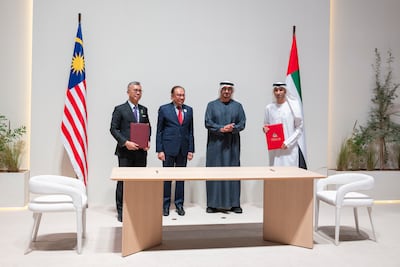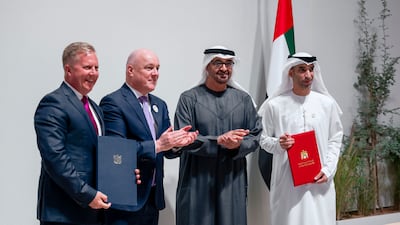The UAE on Tuesday signed Comprehensive Economic Partnership Agreements with Malaysia and New Zealand as the Arab world’s second largest economy continues to bolster trade and economic ties with countries around the world.
Dr Thani Al Zeyoudi, Minister of State for Foreign Trade, signed the new Cepas with his counterparts from Malaysia and New Zealand in Abu Dhabi, according to a Wam statement on Tuesday.
President Sheikh Mohamed joined New Zealand’s Prime Minister Christopher Luxon to witness the signing of the agreement between the nations.
The deal with New Zealand is expected to boost bilateral trade to $5 billion by 2032, tripling the five-year average trade of $1.5 billion shared between two countries from 2019-2023.
"The Cepa represents New Zealand’s first trade agreement with a Middle Eastern nation and is one of the UAE’s most expansive Cepas to date, covering areas that include indigenous trade, sustainable development, women’s economic empowerment, and transparency," the statement said.
The UAE-New Zealand bilateral non-oil trade reached $642 million in the first nine months of 2024, up 8 per cent from the same period in 2023. The countries also signed the Bilateral Investment Treaty on the Promotion and Protection of Investments to strengthen ties along with the Cepa on Tuesday.
The deal with Malaysia signed in the presence of President Sheikh Mohamed and Anwar Ibrahim, Prime Minister of Malaysia, is expected to cement the "UAE’s position as a strategic hub for Malaysian exports to the Middle East and North Africa region while opening up the Asean market to Emirati investors and entrepreneurs".

Currently, the UAE is Malaysia’s second-largest trading partner in the Arab world, accounting for 32 per cent of Malaysia’s trade with Arab countries.
The non-oil trade between the two countries reached $4.9 billion in 2023 and $4 billion in the first nine months of 2024.
The total trade between the two countries for the eleven months of last year was $8.61 billion, up 8.6 per cent on an annual basis, according to the latest data provided by Malaysia’s Investment, Trade and Industry Ministry.
Malaysia’s total exports to the UAE from January to November 2024 grew 3.4 per cent to $2.93 billion as a result of higher exports of electrical and electronic products to the UAE, while imports totalled $5.68 billion, up 11.5 per cent on an annual basis on the back of increased imports of crude oil.
The two countries are targeting a 60 per cent increase in trade in the next five years after the new deal.
UAE's Cepa "is a cornerstone of its efforts to raise the value of its non-oil foreign trade to Dh4 trillion ($1.1 trillion) by 2031 and enhance international co-operation with strategically important markets such as the Association of South-east Asian Nations (Asean), which has a gross domestic product of over $2.9 trillion and a population of 647 million", the statement said.
Apart from Malaysia, the UAE has already signed Cepas with Indonesia and Cambodia in the South-east Asia region, while talks are currently under way with Vietnam.
Malaysia also plans to start negotiations for a free-trade agreement with Gulf countries in May to further strengthen trade and economic ties with the six-member Gulf Co-operation Council, said Tengku Zafrul Aziz, Malaysian Minister of Investment, Trade and Industry.


